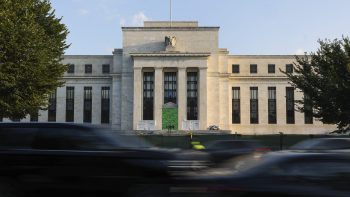Foreign investors wary over U.S. deficit
TEXT OF STORY
Kai Ryssdal: We have told you often enough of the billions in borrowing that the federal government’s doing to finance its various bailout and stimulus programs. And how the market for most of those IOUs, also known as Treasury bills, is overseas. Well, take what I’m about to tell you as an early warning indicator that Uncle Sam might be close to maxing out our collective credit card.
Today, the Treasury Department reported a plunge in foreign purchases of long-term U.S. government debt. It fell to $11 billion in April, from $55 billion the month before. Three of America’s biggest creditors — that’d be China, Japan and Russia — all cut back on their holdings of U.S. debt. And our senior business correspondent Bob Moon reports they are not the only ones getting anxious over the exploding U.S. deficit.
BOB MOON: The government has relied mainly on two ways to raise the vast sums of cash it’s using to prop up the teetering economy: printing it, or borrowing it with the sale of government bonds.
S&P chief economist David Wyss says since most Americans don’t have much money to spare these days, Uncle Sam has had to reach beyond our borders with hat in hand.
DAVID WYSS: We’ve just become very dependent on foreigners, given that Americans don’t want to save money anymore, so we’re running up this huge deficit in savings within the United States, which has to be made up by foreign money.
But that quick cash will dry up if foreigners start doubting we can back the greenback.
WYSS: That means they’re not buying dollars, and that means the dollar is going to be weaker, which means imports are going to cost more than they do now.
There could be more dominoes if foreigners pull more investments, and keep pushing down long-term Treasury prices. Marilyn Cohen heads Envision Capital Management. She says the struggling housing market could be dealt a fresh blow by an unwelcome side effect of higher bond yields.
MARILYN COHEN: It’s long-term mortgage rates, because the Treasury market is a driver for the mortgage rates. And it’s going to be a wonderful excuse for the credit-card companies and lenders to keep their rates up and not lower them.
President Obama has vowed to reduce the deficit as soon as the economic situation permits. But Cohen remains wary.
COHEN: It’s ridiculous for people to think that we’re going to be able to borrow our way out of this financial crisis. Certainly we have to at the beginning, but unless it’s reined in very, very quickly, down the road it will get uglier.
Cohen says foreign investors are clearly signaling it’s time for the U.S. to control its spending.
I’m Bob Moon for Marketplace.
There’s a lot happening in the world. Through it all, Marketplace is here for you.
You rely on Marketplace to break down the world’s events and tell you how it affects you in a fact-based, approachable way. We rely on your financial support to keep making that possible.
Your donation today powers the independent journalism that you rely on. For just $5/month, you can help sustain Marketplace so we can keep reporting on the things that matter to you.


















